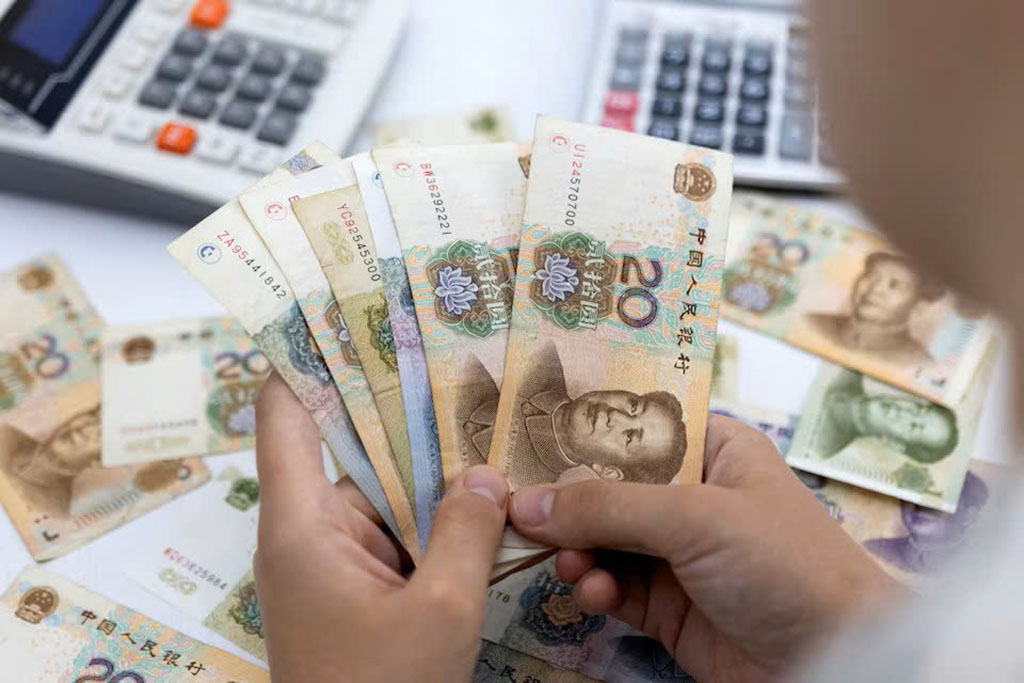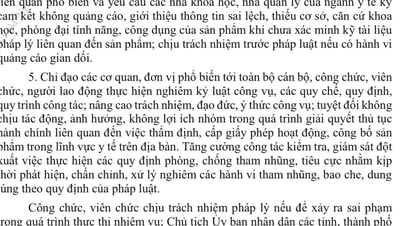Amid the risk of a further escalation of the trade war with the US in the coming time, China is facing a significant challenge to keep the yuan stable.
Yesterday (January 13), the South China Morning Post cited data from the Chinese government showing that the country's trade surplus reached a record in 2024.
Trade surplus of nearly 1,000 billion USD
Specifically, thanks to a surge in exports, especially in the automobile and computer chip industries, as well as achieving strong market share growth in countries participating in the Belt and Road Initiative, China achieved a trade surplus of up to 992.2 billion USD in 2024. Compared to 2023, China's exports increased by 5.9% to 3.58 trillion USD, imports increased by 1.1% to 2.59 trillion USD; of which, exports to the ASEAN market - Beijing's largest trading partner - increased by 18.94% in December 2024 compared to the same period in 2023, and increased by 12% in 2024.

China is having trouble with the exchange rate issue.
However, the above results pose an upcoming challenge for China, which is still largely dependent on foreign markets. Senior economist Gary Ng (French investment bank Natixis) assessed: "China's trade data shows a slow recovery in domestic demand. The recovery in consumer sentiment and real estate remains slow, hurting demand for goods."
Meanwhile, China is facing increasingly large trade barriers. In 2024, according to data from the Trade Remedies Information Administration (Ministry of Commerce) of China, a total of 160 trade investigations were initiated against Chinese goods. The number of investigations is significantly higher than the 69 cases in 2023. The large number of investigations initiated in 2024 could lead to more barriers for Chinese goods in the coming time in many markets. Although overall exports increased, China's exports to the EU - Beijing's second largest export market - decreased by 4.4% for the whole year in 2024. Currently, the EU is promoting many moves towards sanctioning Chinese goods, especially electric cars.
The challenge is growing
Meanwhile, not only the EU, many countries in the southern world (mostly developing economies) have also begun to introduce trade defense measures against Chinese goods.
The biggest challenge is the relationship between China and the US after Donald Trump takes office, scheduled for January 20. In an analysis sent to Thanh Nien , Eurasia Group (USA), the world's leading political risk research and consulting firm, assessed that US-China relations could become unpredictably tense, focusing on trade conflicts, after Trump takes office.
Eurasia Group assessed that the meeting between current US President Joe Biden and Chinese President Xi Jinping in November 2023 in San Francisco (USA) did not resolve bilateral disagreements, but it somewhat restrained bilateral tensions from getting out of control. However, after Mr. Trump took office, US-China relations are facing many unpredictable risks.
In order to increase resources for the economy, the People's Daily (China) reported yesterday (January 13) that the government has just loosened policies to allow domestic enterprises and financial institutions to mobilize more foreign capital.
This move could help China maintain the value of the yuan amid its currency depreciation. In early January, the yuan hit 7.3 yuan to the dollar for the first time. Meanwhile, the People's Bank of China (which acts as the central bank) still imposes a fixed exchange rate of about 7.1876 yuan to the dollar. According to the South China Morning Post, citing an assessment from Nomura Bank (Japan), the exchange rate could reach 7.6 yuan to the dollar in 2025.
The devaluation of the yuan will benefit China's exports, but if the price falls too much, the country may be subject to increased sanctions from the US based on the accusation of "currency manipulation" to benefit exports. However, expanding foreign borrowing poses many potential risks for the Chinese economy when domestic consumption remains stagnant. If businesses do not operate effectively, it will lead to the risk of increasing foreign debt.
Therefore, China is facing a significant challenge in managing its currency exchange rate in the midst of many economic difficulties.
Source: https://thanhnien.vn/nhan-dan-te-truoc-nguy-co-thuong-chien-bung-phat-185250113225109341.htm


![[Photo] More than 17,000 candidates participate in the 2025 SPT Competency Assessment Test of Hanoi National University of Education](https://vphoto.vietnam.vn/thumb/1200x675/vietnam/resource/IMAGE/2025/5/17/e538d9a1636c407cbb211b314e6303fd)
![[Photo] Prime Minister Pham Minh Chinh chairs meeting on science and technology development](https://vphoto.vietnam.vn/thumb/1200x675/vietnam/resource/IMAGE/2025/5/17/ae80dd74c384439789b12013c738a045)

![[Photo] Readers line up to visit the photo exhibition and receive a special publication commemorating the 135th birthday of President Ho Chi Minh at Nhan Dan Newspaper](https://vphoto.vietnam.vn/thumb/1200x675/vietnam/resource/IMAGE/2025/5/17/85b3197fc6bd43e6a9ee4db15101005b)











![[Photo] Explore the Great Wall of Water in the Suburbs of Beijing, China](https://vphoto.vietnam.vn/thumb/402x226/vietnam/resource/IMAGE/2025/5/5/c2e706533d824a329167c84669e581a0)


















![[Photo] Nearly 3,000 students moved by stories about soldiers](https://vphoto.vietnam.vn/thumb/1200x675/vietnam/resource/IMAGE/2025/5/17/21da57c8241e42438b423eaa37215e0e)






































































Comment (0)